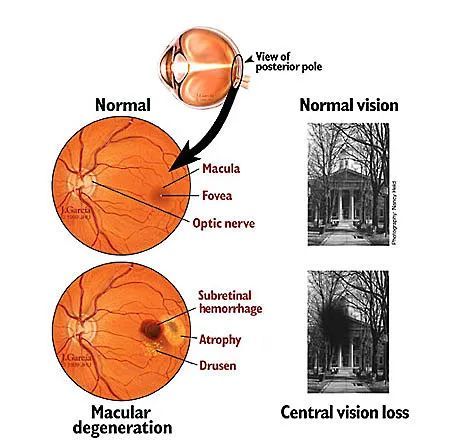Macular Degeneration Solutions in Southeast Idaho

MACULAR DEGENERATION
Macular degeneration is a deterioration of the macula which is the small central part of the retina in the back of your eye. The macula allows you to see fine details clearly and advanced macular degeneration can eliminate your ability to read and drive. It does not affect your peripheral vision. Therefore it never results in total blindness.
Most people have the dry form of macular degeneration in which vision loss is gradual. The wet form of macular degeneration accounts for about 10% of all cases and results when abnormal blood vessels from underneath the retina leak fluid or blood. Visual loss can be rapid and severe with the wet form.
Macular degeneration may be hardly noticeable in its early stages. It is often first noted when words on a page looked blurred and straight lines look distorted. In more advanced cases, a dark or severly distorted area appears in the center of the vision.
Although the exact cause of macular degeneration is not fully understood, certain antitoxidant vitamins, lutein, and zinc may reduce the impact in some people. Anti-VEGF injection treatments are used for wet macular degeneration and have largely replaced laser treatments. Anti-VEGF( vascular endothelial growth factor) reduces the growth of abnormal blood vessels and slows their leakage.
You can check your vision daily or weekly by using an amsler grid like the one pictured below. To use the grid, wear your reading glasses and look directly at the grid from 12 to 15 inches away with one eye covered. Look directly at the center dot and note whether all the lines of the grid are straight or there are areas of distorsion, blurriness or darkness. Repeat this procedure with the other eye. If any area of the grid looks wavy, blurred or dark this could indicate the conversion of dry to wet macular degeneration and you should contact your ophthalmologist.
For more information on macular degeneration, call our office today at 208-238-3377.